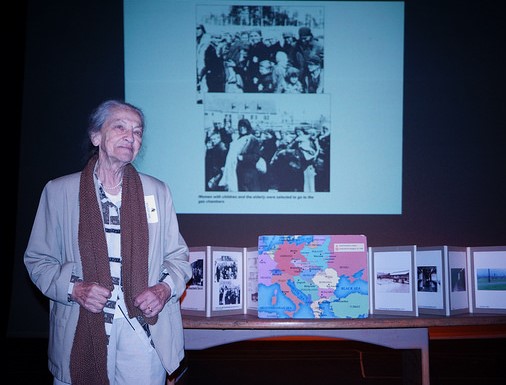
On Facebook and Denial of Massacres
Irina Raicu is the director of the Internet Ethics program at the Markkula Center for Applied Ethics at Santa Clara University. Views are her own.
You might have read, by now, that Mark Zuckerberg recently explained, in an interview with Recode’s Kara Swisher, why Facebook would not take down posts that deny the Holocaust. Swisher had asked him about posts asserting, falsely, that the Sandy Hook school shooting never happened. Zuckerberg agreed with Swisher that “Sandy Hook didn’t happen” is a false assertion; he then continued:
I also think that going to someone who is a victim of Sandy Hook and telling them, “Hey, no, you’re a liar” — that is harassment, and we actually will take that down. But overall, let’s take this whole closer to home... I’m Jewish, and there’s a set of people who deny that the Holocaust happened. I find that deeply offensive. But at the end of the day, I don’t believe that our platform should take that down because I think there are things that different people get wrong.
Earlier in the interview, he had explained a different set of circumstances in which Facebook would, however, remove postings:
Let me give you an example of where we would take it down. In Myanmar or Sri Lanka, where there’s a history of sectarian violence, … because that creates an imminent harm. The principles that we have on what we remove from the service are: If it’s going to result in real harm, real physical harm, or if you’re attacking individuals, then that content shouldn’t be on the platform.”
So Zuckerberg maintains that addressing a victim and calling him or her a liar would constitute harassment, and lead to a post’s removal, but that denying the victimization of an entire group, and addressing the denial to the world at large, is different than “attacking individuals.”
In one of the many responses to those comments, historian Deborah Lipstadt explains that
[f]or [Holocaust] deniers to be right…[s]urvivors would have to be wrong -- as well as bystanders, those non-Jews who … watched their Jewish neighbors being marched away to be shot and killed in freshly dug ditches in the woods. The scores of historians who have studied the Holocaust since 1945 would either have to be part of a massive conspiracy or have been completely duped. But, above all, the perpetrators, some of whom have admitted their guilt, would have to be wrong.
It's not just that they’d have to “be wrong,” though—at least in the case of the perpetrators, and, much more importantly, the survivors: all the thousands of people who have told their stories and mourned their loved ones, in public testimonies and in private, quiet moments. Those, all of those, would have to be not just “wrong,” but lying.
For Holocaust survivors, stories denying the Holocaust have precisely the same effect as, to use Zuckerberg’s words, going to a victim and telling them “Hey, no, you’re a liar…” It is a kind of harassment done at scale, impersonal, just as so much of the torture and killing that took place during the Holocaust was at scale and impersonal.
The failure to recognize this is deeply problematic, particularly in the case of a platform that is all about scale. For all its talk about connecting friends and family, Facebook also loves to announce its user numbers (and the number of times they check Facebook, or the amount of time they spend on it). It also takes cover behind its scale at times—as when explaining the inherent difficulty of content removal, given such numbers.
But the refusal to remove denials of recent genocides and mass shootings causes both harm at scale (as researchers point out) and harm on an individual basis.
The parent of a child killed at Sandy Hook, who comes across a story claiming that the killing never happened, is told that both the life and the death of his or her child was a lie—and that he or she is a liar. Holocaust denial stories tell survivors the same things, about themselves and all the others they knew who were killed: that they themselves are liars, and that their loved ones never lived.
We might debate whether such claims would still constitute harassment after the last Holocaust survivors and the family members of Sandy Hooks victims and the witnesses of events like the Holocaust or Sandy Hook are gone. For now, though, posts that deny those events are, in fact, “attacking individuals.”
Photo of Holocaust survivor Dora Sorrell, by Mark Coplan, used, without modification, under a Creative Commons license.
